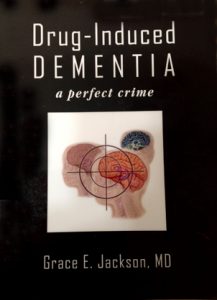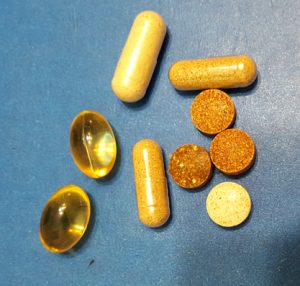Note: This blog is not medical advice and does not replace consultation with a qualified medical professional of your choosing.
When antidepressants started to become popular in the 1990’s, often they were not prescribed until the client had seen a therapist weekly for 3 to 6 months. If the therapy did not reduce the person’s emotional problems, medication was prescribed with the intention that it would be prescribed short term while the client continued to improve with the help of therapy. Now people are prescribed medication by their medical doctors or their psychiatrist at their first appointment. They are sometimes told they have a bio-chemical imbalance that will require them to take medication the rest of their lives. Often people take the medication and don’t seek therapy.
In the 1990’s I worked at a community mental health clinic in Detroit. Most clients with depression or anxiety were prescribed one medication. People with schizophrenia were often prescribed a second medication to help reduce the side effects of the anti-psychotic medication they were prescribed. In the last few years it is not unusual for people to be prescribed 2 to 3 medications, and up to 5 medications if they have bi-polar disorder.
Dr Grace Jackson, psychiatrist and scholar, wrote Drug-Induce Dementia-The Perfect Crime.

Jackson uses research and scientific evidence to document how dangerous it can be to take any of the 5 major classes of psychiatric medications: antidepressants, anti-psychotics, psycho-stimulants, tranquilizers and anti-seizure/mood stabilizer drugs. Dr Jackson writes compelling evidence that these medication have shown microscopic, macroscopic, immunologic,biochemical, clinical evidence of brain shrinkage and other signs of brain damage, especially when used long term.
Jackson puts together research findings from epidemiology, basic biology (animal experiments), more than 100 neuro-images, autopsy studies, slides of tissue specimens and illustrations. She details 8 mechanisms of psychiatric medications that lead to dementia. One mechanism is oxidative stress and free radicals which cause a chemical reaction that “can result in cell death”. She said the chemical reaction that is the most extensively researched phenomena in toxicology is how stimulants (ie Ritalin, Concerta, Adderal) “incite the degeneration of dopamine and serotonin nerve …endings”.
Benzodiazepines medications include Xanax, Ativan, Valium, and Klonopin. Dr Jackson writes that these medications are “associated with persistent cognitive deficits”. Even when people stop taking this kind of medication for 11 months, findings suggest “lasting and possibly irreversible drug effects”
Another problem psychiatric drugs cause is interfering with the absorption of essential nutrients. Suzy Cohen, a licensed pharmacist for over 20 years, wrote the book Drug Muggers detailing which medications deplete which nutrients. She also suggests what supplements can be taken to restore some of these nutrients.
Journalist and health science writer Robert Whitaker studied many years the effects psychiatric drugs have on people. His first book, Mad in America: Bad Science, Bad Medicine and the Enduring Mistreatment of the Mentally Ill , came out in 2002. He wrote that from the mid 1950’s to 2002, there was a 600 % increase in total and permanent disabilities of people who took psychiatric drugs.
Anyone who is prescribed one of these psychiatric medications is given a long list of possible short and long term toxic effects. There are no long term studies of how these medications will affect people especially when they are prescribed with numerous other medications at the same time.
Dr Kohls is a family practitioner who specializes in holistic and preventive mental health care. He wrote that after working with over 1000 people with mental problems, he agreed with Dr Jackson and Mr Whitaker. Dr Kohls stated that the long term use of psychiatric drugs “is a major cause of cognitive disorders, dementia,” and the following losses: memory, creativity, IQ points, empathy, impulse control and spirituality. He also mentions metabolic problems of weight gain, hypertension, and diabetes.
Another reason I am concerned about the use of medications is how difficult it can be for people to stop taking certain medications and adjust to new medications.In 2015 in the Journal Psychotherapy and Psychsomatics, authors Chouinard G.a, b · Chouinard V.-A.c write that “When treatment with a CNS drug is discontinued, patients can experience classic new withdrawal symptoms, rebound and/or persistent post withdrawal disorders, or recurrence of the original illness”
It is commonly thought that some people must take psychiatric medications to function, especially those that are severely depressed, schizophrenic or have bi-polar disorder. Given that health insurance will only pay for medication, this is probably true. However since there are new breakthroughs in using nutritional supplements to reduce symptoms or stopping them, this method would need to be tried in addition to taking medications. (see my blog post:here).
Francine Shapiro, who developed the therapeutic technique of EMDR, tells how effective EMDR is for many different mental problems: Here. She describes one study done by Van der Kolk in 2006 where 8 EMDR sessions were more effective than the popular antidepressant Fluoxetine (Prozac).To learn more about these research results, go here. I know 4 local chiropractors who have reported reducing anxiety and depression using whole food supplements. I have had several clients tell me they use natural supplements to reduce panic attacks, anxiety, mood swings or depression. 
Dr Chrstine Kazmer of Shelby Twp MI recommends people eat at least 60 mg of protein a day so they have enough amino acids to make the necessary neurotransmitters that increase relaxation and happiness.
I believe many people taking psychiatric medications for anxiety and depression could find natural methods such as whole food supplements, intensive psychotherapy that reduces the effects of trauma, cutting out processed foods (fake foods), supervised fasting, exercise, and yoga that would work just as well if not better than medications. Sometimes the supplements are expensive to the point not everyone can afford them. Natural methods also usually take longer for positive changes than medications. Other methods such as yoga, exercise, fasting, stopping smoking, and meditation are free but require more self- discipline. In the long run these methods are far healthier and worth the extra effort.
My desire to learn is insatiable, particularly learning more how to help people reduce their depression, trauma, overeating and anxiety using natural methods. I do not discourage my clients who are taking psychiatric medications from taking their medications. I have referred a few of my clients to see a psychiatrist.
If someone wants to work towards getting off their medications gradually using tapering under the supervision of his/her doctor, I would support that effort any way I could. I refer my clients to helpful videos, blog posts, books, meet-up groups and self- help groups. If you are interested in working with me, please call or text me at 586-799-2399, or write me at: suzanneenergy@gmail.com
